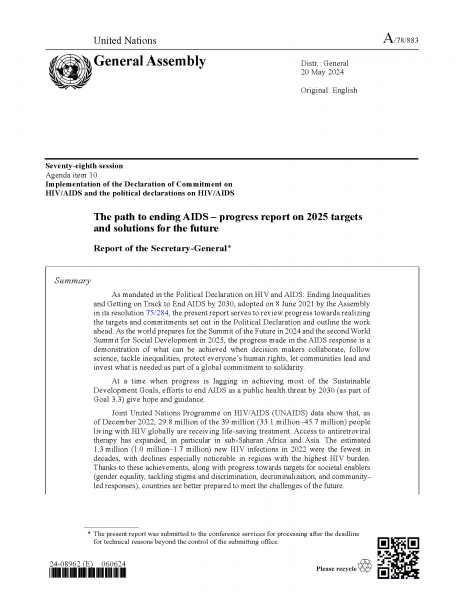On 19 June 2024, the United Nations General Assembly convened to evaluate the progress made in the response to the AIDS epidemic. The yearly session provided a platform for Member States to reflect on achievements, confront persistent barriers, and chart a course forward towards ending AIDS by 2030. The UN Secretary-General’s progress report formed the basis of the debate.
Member States celebrated the significant achievements towards ending AIDS, while highlighting ongoing challenges that must be overcome to reach the promise of ending AIDS as a public health threat by 2030.
The commitment to the 95-95-95 targets and the progress made in eliminating vertical transmission of HIV, especially through the use of decentralized community-based services, were highlighted as pivotal to the success of the HIV response.
Many member states stressed the crucial role that promoting a human rights-centered approach has had in the fight against HIV. They highlighted the significance of comprehensive multi-sectoral responses, including education on sexuality and robust support for sexual and reproductive health and rights. They pointed to the harm of actions that undermine gender equality and LGBTQI+ rights. They emphasized the shared duty of every country to protect everyone’s human rights.
The need for continued global solidarity and enhanced multilateral cooperation was emphasized as key to tackling the remaining challenges. Calls for increased domestic and international funding were echoed, noting that sustained investment is crucial to maintaining progress and for expanding access to innovative prevention and treatment options.
The UN General Assembly annual review served as a poignant reminder of the collective responsibility to uphold the rights and dignity of all people affected by HIV.
Inspired by the lessons learnt from the AIDS response, the upcoming Summit of the Future scheduled for September 2024 will explore how common challenges can be overcome.
Against a backdrop of geopolitical shifts and economic uncertainties, the HIV response serves as a beacon of how multilateral solidarity saves and transforms lives.



